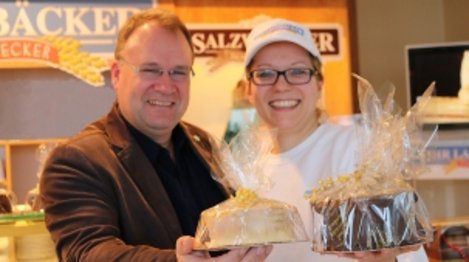Salzwedeler Baumkuchen is an international best-seller

According to the traditional original recipe, eggs, butter and sugar are mixed together until fluffy and then flours and maize starch is added – and a fiercely guarded secret which contributes to the familiar moist consistency and the traditional taste of the Salzwedeler Baumkuchen. Andreas Bosse, owner and managing director of Stendaler Landbäckerei GmbH, is keeping quiet and enjoys the thought of making the pastry. Fresh eggs are cracked one-by-one; the egg whites are whisked until stiff and then folded into the mixture. After baking, the baumkuchen is portioned out and coated in chocolate or fondant. “Preservatives still have no place in our traditional pastries. The shelf life is mainly influenced through the baking process,” says Andreas Bosse, touching on another problem: That fresh pastry travelling far overseas is not necessarily common. The export share of baumkuchen is about five percent.
What was enjoyed at the Prussian royal court is now a “regional brand”. With the growing mobility of people, the delicacy is achieving fame beyond the borders of Saxony-Anhalt. The name “Salzwedeler Baumkuchen” is literally on everyone’s lips – in Regensburg, Hamburg, Vienna, Paris... . “Of the 85 tonnes produced in 2014, over 27 tonnes of baumkuchen were produced in the Christmas period alone,” says the company’s boss, adding that orders were received in the online shop from the Czech Republic, Belgium, Austria and Switzerland, from Japan, Italy, Spain, Great Britain and the USA. “At the end of their journey, the baumkuchen should still have their familiar taste and melt in the mouth,” this is the demand of the country baker on his pastry. And what’s more: “When they have left our bakery, the moist cakes should not react too sensitively to changed climatic conditions or storage conditions and grow mould.
”When manager Andreas Bosse has a technical problem to solve, he relies on a tried-and-tested recipe: He mixes traditional craft and skill with young innovative ideas. And he makes sure in advance that the right “ingredients” are available. I.e.: Many years of professional experience and modern university knowledge complement each other in the bakery.
30-year-old Judith Perlberg entered the company in 2006 – initially to complete her thesis on the subject of quality assurance. Works manager Bosse kept the young food economist on in his company. “If would have been a shame if the quality management developed for our bakery had not been put to practical use,” laughs Bosse. In addition, he gave his young worker the responsibility for a research and development project, sponsored by the Saxony-Anhalt Ministry of Science and Economic Affairs: “Product development of pastry products with improved shelf life.” “The success at the end was down to teamwork,” Judith Perlberg is keen to emphasise. Employees of Stendaler Landbäckerei GmbH, students of process engineering at the Otto-von-Guericke University in Magdeburg and Anhaltische Verfahrens- und Anlagentechnik GmbH in Magdeburg researched together.Judith Perlberg and Andreas Bosse have to smile when they remember the wired-up baumkuchen bakery. Airflows were measured, countless thermal images were taken and analysed. The bakers, carrying out their physically demanding trade at the ovens which can be up to 90 degrees, asked at times what it was all about: It is up to 55 degrees in the bakery when the flames from the burner pipe are blazing before the roller turns. The pastry is applied layer by layer and baked by turning it in front of the fire. When it is later cut, the layers look like the year rings of a tree which gave the cake its name in German, literally “Tree Cake”.
After many measurements and analyses into how the warm air moves in the room, a new ventilation concept was developed next to the plant as part of the research project. “The air circulation in the room is now controlled without opening any windows, which also improves the microbiological conditions when producing fine pastries,” explains the specialist in home economics. “The new system reduces the room temperature by up to 10 degrees.” Company boss Bosse is pleased, “Every single degree lower contributes to improving working conditions. Which in turn helps us to find the next generation of workers for the baumkuchen bakery.”
In spring 2014, a burner pipe was installed that was specifically developed for the baumkuchen. It optimises the flames and guarantees an even and more intensive baking of the pastry layers. In addition, various tests under extreme conditions in the climate chamber showed that temperature deviations are detrimental to baumkuchen as well as sponges and other cakes at the Stendaler Landbäckerei. As a result, the company set up a separate storeroom for its packaged pastries. To date, the Landbäckerei has invested about 50,000 Euro in measures resulting from the findings of the research project.
The shelf life of baumkuchen and other pastries has been extended by two days from 16 to 18 days. “This is an enormous amount for fresh products,” emphases Judith Perlberg. Her boss adds, “We are still looking for suitable packaging material, in which a microclimate exists, which does not dry out our pastries and does not make them sweat either.”
Author: Kathrain Graubaum (text/photo) on behalf of Investment and Marketing Corporation Saxony-Anhalt
Captions: Food economist Judith Perlberg and Andreas Bosse, owner of Stendaler Landbäckerei GmbH, present their internationally popular “Salzwedeler Baumkuchen”.
Contact:
Stendaler Landbäckerei GmbH
Industriestraße 8
39576 Stendal
Germany
phone: +49 (0) 3931 69900
Email: info@ihrlandbaecker.de
